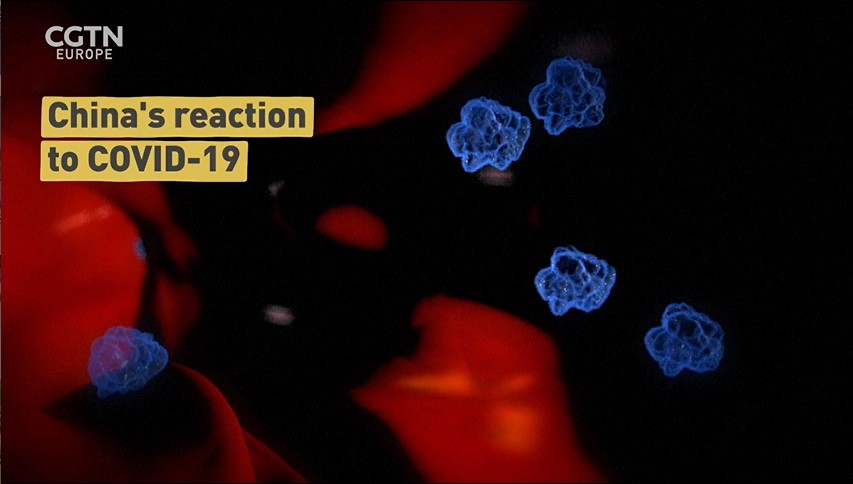04:44

Ambassador Chen Xu is one of China's most senior diplomats.
We sit down for our interview at Beijing's Permanent Mission to the United Nations in Geneva on a sunny Saturday afternoon. From the Mission you can look east, up to the snow-capped Alps; around 200 kilometers in that direction is Switzerland's border with the Italian province of Lombardy, parts of which are currently on lock-down because of the COVID-19 coronavirus.
Read more CGTN Europe's COVID-19 coronavirus coverage
By Sunday morning, Italian prime minister Antonio Conte will have introduced "extraordinary measures" to contain what is now Europe's largest outbreak of COVID-19, both in Lombardy and Veneto further east.
Those provinces' capitals are among Italy's most famous: one the finance-and-fashion hub of Milan, the other one of the world's best-loved tourist destinations, Venice. Both are a vital part of an Italian economy which has struggled for years.
Inter Milan's Serie A football fixture against Sampdoria was quickly postponed, followed by games in Verona, Bergamo and Turin. Expect more disruption in the coming hours and days. Italian authorities say they already fear the virus may have spread beyond a few isolated clusters, making it much harder to contain.
COVID-19's impact was already very real for the ambassador and his entourage, many of whom say they might usually have headed back to China over the Lunar New Year to see family and friends. Instead, they remain in Switzerland, working overtime and trying to rally international support while worrying about loved ones back home. The news of the past few hours from Italy must make that impact even more real.

A woman walks by Turin's deserted Olympic Stadium on Sunday, where Torino's home match with Parma was postponed hours before kick-off (Credit: Nicolò Campo/LaPresse via AP)
A woman walks by Turin's deserted Olympic Stadium on Sunday, where Torino's home match with Parma was postponed hours before kick-off (Credit: Nicolò Campo/LaPresse via AP)
Chinese diplomats, including Chen himself, have said repeatedly that the early measures Chinese authorities took - in the epicenter of Wuhan and indeed across the country - have proven effective. Still, though, the virus is spreading. The head of the World Health Organization (WHO), also Geneva-based, said on Friday that the window to prevent a global pandemic was narrowing.
So perhaps the first question to the ambassador was inevitable: should others do what China has done?
"The measures taken by other countries need to be tailored to the specific conditions," says Chen.
That can be difficult to judge. An early - and still to date the largest - cluster outside China was within Japan's jurisdiction, on board the Diamond Princess Cruise liner. The quarantine enforced by authorities has been roundly criticized, raising questions about how to deal with the increasing number of small clusters now popping up in various parts of the world.
The WHO's guidelines are for actions proportionate to the level of risk. However, there is much that health experts do not know about this virus, including - definitively - how it spreads. This is new for everyone, leaving some unavoidable uncertainty about what the exact balance should be.

China's ambassador to Russia, Zhang Hanhui (center), is optimistic about controlling the epidemic (Credit: Aleksey Nikolskyi, Sputnik, Kremlin Pool Photo via AP)
China's ambassador to Russia, Zhang Hanhui (center), is optimistic about controlling the epidemic (Credit: Aleksey Nikolskyi, Sputnik, Kremlin Pool Photo via AP)
China's ambassador to Russia, Zhang Hanhui, told Russian lawmakers last week that "in the center of the epidemic, the disease will be liquidated next month." Does Zhang's Geneva counterpart share that same sense of optimism?
"I do share the optimism," says Chen, "but in terms of the timeframe, I am not in a position to pre-judge." Like all of us, the Ambassador says he can only hope that it might be possible to eliminate the virus even sooner.
That will be extremely difficult. But even with the number of new infections dropping in China according to the latest counts, new cases in South Korea, Italy and Iran are raising concerns the danger could be a long way from over and indeed could yet become far worse.
The number of cases worldwide long ago outstripped other recent similar outbreaks. There have now been 78,810 confirmed cases of COVID-19 worldwide. By comparison, over an eight-month period, SARS infected just 8,096.
There had been many questions about the reliability of the figures coming out of China. Earlier in the month, officials in Hubei province had changed the method of counting to include all suspected cases of COVID-19; previously, only lab-confirmed cases were reported.

Ambassador Chen Xu, speaking to CGTN in Geneva (Credit: CGTN)
Ambassador Chen Xu, speaking to CGTN in Geneva (Credit: CGTN)
That led to a huge spike in numbers - until the methodology was changed back again at the end of last week. On Friday, the WHO corroborated China's insistence that there were sound reasons underpinning that decision.
"There were too many on the waiting list," Chen says. For a time, China was struggling to carry out tests on suspected cases fast enough - so officials decided their only choice was to report the more expansive figure of all those who might have the disease. Since then, that backlog has cleared - and that, says Chen, is why the count has now returned to only confirmed cases.
A joint team from the WHO and China entered Wuhan province for the first time on Saturday. Their most pressing task will be to figure out what is working and what may not have been so effective in containing the virus.
Just over the horizon from where we sit, officials in Lombardy will want those answers soon as well.
Remember to sign up to Global Business Daily here to get our top headlines direct to your inbox every weekday